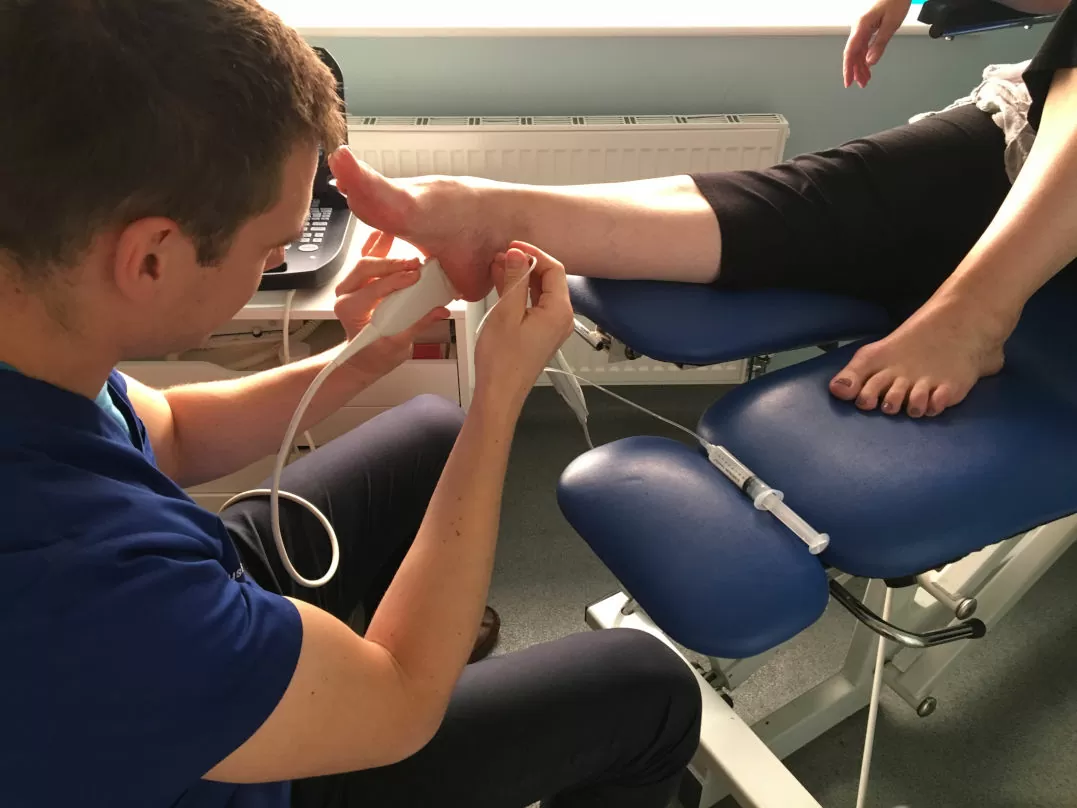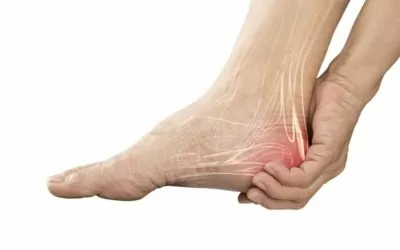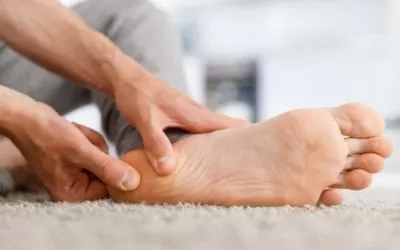Diagnosing Plantar Fasciitis
Plantar fasciitis is one of the most common causes of heel pain and is characterised by a stabbing pain in the bottom of your foot near the heel. The condition is brought on when a thick band of tissue across the bottom of your foot (called the plantar fascia) becomes inflamed. This inflammation can take a long time to develop, but it is typically caused due to a sport-related activity or as a result of a poor choice of footwear.
Book Your Initial Consultation with Ultrasound Appointment for £60.00
What are the causes of plantar fasciitis?
There are several risk factors that can increase your chances of developing plantar fasciitis. These typically include:
- Over-exercising – like running or jumping-related exercises can cause inflammation.
- Poor footwear – as incorrectly sized shoes don’t give a sufficient level of protection to your feet.
- Obesity – as the added weight puts extra stress on your feet and plantar fascia tissue.
- Standing for long periods – as being on your feet for several hours can damage the tissue.
- Age – as plantar fasciitis is more common in people aged between 30 and 60 years old.
What are the common symptoms?
Plantar fasciitis causes a stabbing pain in the base of your foot, which you particularly feel when first standing up for the day. The pain usually subsides as the day goes on, but worsens again following long periods of standing and exercising.
Since plantar fasciitis is referred to as an overuse injury, it is particularly affiliated with sports that involve running or jumping.
How is it diagnosed?
The most accurate method for diagnosing plantar fasciitis is via a Foot Ultrasound. While it may be possible to self-diagnose the condition, in order to truly understand the extent of the issue and know which treatment plan will be most suitable, you will require the support of a professional. Fortunately, our dedicated team at Sussex Foot Centre are here to help. Call us today to book an appointment.

What is the process for a Plantar fasciitis ultrasound?
So, what exactly is the process involved with a foot ultrasound? And what do they do?
Plantar fasciitis ultrasounds are an imaging method that uses high-frequency sound waves to produce accurate images of muscles, tendons, ligaments, and joints within particular areas of the body. They are a completely painless procedure and only take approximately 15 minutes to complete.
Here is what the process involves:
- A small amount of jelly-like gel is applied to the area causing you pain. This gel is designed to prevent air pockets, which often interfere with the sound waves that are used when developing the images.
- Next, a small hand-held device will be moved across the affected area, capturing the picture simply and painlessly. This image will then show on the ultrasound monitor, allowing you to see the inner workings of your foot in real time.
- During this stage, your podiatrist will be able to see the extent of the issue at hand and be able to evaluate which treatment plan will be best suited to you.
- At the end of the examination, a member of our team will explain what they found, and talk through with you any next steps required.
- You will then, if required, start an appropriate treatment plan to try and resolve the issue.
For a quick overview of what a foot ultrasound will involve, check out the video at the top of this page.
What is Ultrasound?
Once a musculoskeletal ultrasound has pinpointed a specific issue, a foot ultrasound-guided injection will often be used to ensure that treatments are accurately administered. Using our ultrasound equipment, we can guide injections of cortisone to the exact location that’s causing pain, helping to ensure the effectiveness of our treatments.
How can you treat plantar fasciitis?
Treating plantar fasciitis really depends on the severity of the issue. For less severe conditions, home-based care can make a big difference. Here are some of our top tips on how to prevent its onset:
- Invest in good, appropriately-sized footwear.
- Use an ice pack on the affected area whenever pain arises.
- Keep your foot nice and rested when on your feet all day.
- Stretch your feet using suitable daily stretching exercises to strengthen the plantar fascia.
- Use a night splint to stretch the plantar fascia as you sleep.
If these recommendations don’t work for you, and you are still in pain after several months, a more invasive treatment could be required to resolve the problem. Some examples of these include:
- Steroid injections – to deliver more effective pain relief.
- Physical therapy – to strengthen your lower leg muscles and stretch the plantar fascia.
- Shock wave therapy – to stimulate healing in the area of heel pain.
- Tenex procedure – to remove the scar tissue of plantar fasciitis without surgery.
- Surgery – to detach the plantar fascia from the heel bone.
Here at Sussex Foot Centre our expert team of podiatrists are able to identify and treat a whole host of lower limb-related issues, including plantar fasciitis. If you are suffering from chronic heel pain, make sure to contact us today, or book an appointment by clicking the button below.
Achilles Tendon Pain
The Achilles Tendon, which Is also named the Calcaneal Tendon is avery durable, strong band of tissue. It connects the calf muscles tothe heel bone, and it is the strongest tendon in the human body, capable of holding up...
Plantar Fasciitis: What is it?
Plantar Fasciitis is a common condition treated at The Sussex Foot Centre. ThePlantar Fascia is a large band of tissue which is situated along the bottom ofthe foot. Medical research states that Plantar Fasciitis affects up to 10% of thepopulation. It is therefore...
Calling All Runners
Calling all runners, we want to hear from you! If you are experiencing any aches and pains during or after your run, we would love to talk to you and discuss exactly how we can help. For a limited period of time, we will be...
BOOK AN APPOINTMENT
Follow the form below to get through directly to one of our Podiatrists at the practice or to request an appointment.
Or call — 01444 453874
"*" indicates required fields



